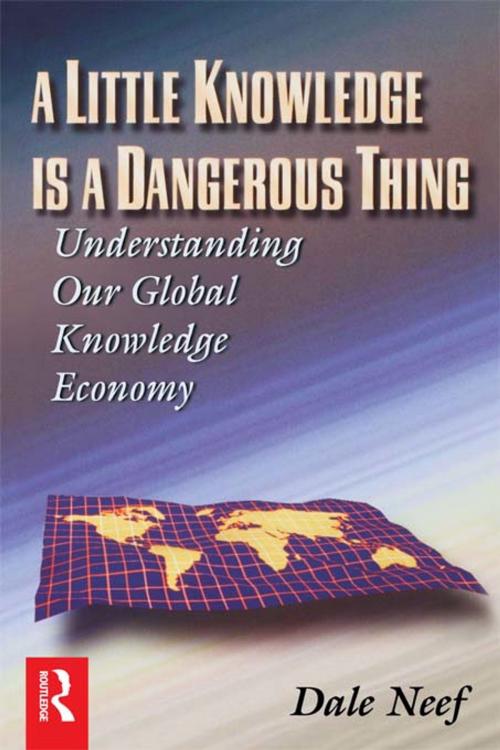| Author: | Dale Neef | ISBN: | 9781136014253 |
| Publisher: | Taylor and Francis | Publication: | May 13, 2013 |
| Imprint: | Routledge | Language: | English |
| Author: | Dale Neef |
| ISBN: | 9781136014253 |
| Publisher: | Taylor and Francis |
| Publication: | May 13, 2013 |
| Imprint: | Routledge |
| Language: | English |
It is said that a little knowledge is a dangerous thing. It is a time honored cautionary statement that has suddenly acquired a new urgency. A little knowledge is dangerous, because as a force for dramatic change, knowledge today is revolutionary. More is known and being learned everyday than was ever known or learned before. As a direct result, the pace of change-and that means change in the sense of everything from business to economics, science, medicine, and politics-is beginning to accelerate much more rapidly than ever before in mankind's history.
The purpose of this book then is twofold. First it is to provide a broader case for action for knowledge management-to explain what it is, why it has come about and why it is important. In this regard, we take a step back and try to understand the root causes behind the knowledge management techniques are very different, and in many ways more important, than the sort of process or productivity improvement techniques we have dealt with before.
"Brains, not brawn. The success of countries, companies and people in the next century will depend on what they know and how clever they are at using this knowledge. Dale Neef has given us the best outline yet of the forces behind this extraordinary change in the world economy, the threats and opportunities we all face, and the prizes that await the winners."
-Hamish McRae, author, The World in 2020, Associate editor, "The Independent", London
"Dale Neef has produced a singular achievement: a book which lucidly
explains the powerful driving role being played by knowledge in the emerging global economy. He provides a penetrating, all-too-rare trans-national perspective which highlights in a highly readable manner the historical, social and technological context within which this revolution is taking place. In doing so, he has stripped away the hype and jargon with which many knowledge management "experts" have clouded this structural change in the global economy.
Mr. Neef offers a fascinating array of facts to support his explanations and goes on to discuss the implications of these developments for managers, for companies and for national governments. This book is a must-read for anyone actively engaged in global business today."
-Jon Lowe, Former U.S. Deputy Assistant Secretary of Labor
"A Little Knowledge Is a Dangerous Thing provides a very comprehensive view of the impact that the knowledge revolution on our 21st Century society. The economic dislocations that Dale Neef describes are already taking place, creating the prospect that large segments of our population may not have the skills for sustainable employment in the future. The implications of these events on the social and political fabric of our country give one great pause for reflection and concern."
-William R. Brody, President, The Johns Hopkins University
"Once again, Dale Neef combines just the right amounts of theory, academia and practical business experience to write a truly insightful book. In his consulting work, Mr. Neef's broad business, cultural and educational background has allowed him to analyze problems from a rich variety of perspectives. In this book, he artfully applies this skill to Knowledge Management."
-James R. Breakey, Senior Vice President, Chief Information Officer, Green Tree Financial Corporation
"This book is full of facts... that we need to understand if we are to draw critical conclusions about how the knowledge economy is impacting our businesses and our lives. Neef provides us with a broad perspective, concentrating not just on the US, but including insightful comparisons with Canada and Europe as well as many developing countries. The numbers provide an eye opening look at what has changed and what is changing in the knowledge economy...It is a book that challenges our thinking and ...provides a much needed conceptual framework to guide the actions organizations will need to take in the knowledge economy."
-Nancy M. Dixon, Associate Professor of Administrative Sciences, The George Washington University
"Leveraging employee knowledge has become a strategic necessity for all "high road" companies, and organizations must optimize knowledge management techniques in the new global economy. Ford understands the need to capitalize on the knowledge of our employees in order to improve our business and enhance shareholder value in what is now a knowledge-based, global economy."
-Dar Wolford, Ford Manager, Best Practice Replication
It is said that a little knowledge is a dangerous thing. It is a time honored cautionary statement that has suddenly acquired a new urgency. A little knowledge is dangerous, because as a force for dramatic change, knowledge today is revolutionary. More is known and being learned everyday than was ever known or learned before. As a direct result, the pace of change-and that means change in the sense of everything from business to economics, science, medicine, and politics-is beginning to accelerate much more rapidly than ever before in mankind's history.
The purpose of this book then is twofold. First it is to provide a broader case for action for knowledge management-to explain what it is, why it has come about and why it is important. In this regard, we take a step back and try to understand the root causes behind the knowledge management techniques are very different, and in many ways more important, than the sort of process or productivity improvement techniques we have dealt with before.
"Brains, not brawn. The success of countries, companies and people in the next century will depend on what they know and how clever they are at using this knowledge. Dale Neef has given us the best outline yet of the forces behind this extraordinary change in the world economy, the threats and opportunities we all face, and the prizes that await the winners."
-Hamish McRae, author, The World in 2020, Associate editor, "The Independent", London
"Dale Neef has produced a singular achievement: a book which lucidly
explains the powerful driving role being played by knowledge in the emerging global economy. He provides a penetrating, all-too-rare trans-national perspective which highlights in a highly readable manner the historical, social and technological context within which this revolution is taking place. In doing so, he has stripped away the hype and jargon with which many knowledge management "experts" have clouded this structural change in the global economy.
Mr. Neef offers a fascinating array of facts to support his explanations and goes on to discuss the implications of these developments for managers, for companies and for national governments. This book is a must-read for anyone actively engaged in global business today."
-Jon Lowe, Former U.S. Deputy Assistant Secretary of Labor
"A Little Knowledge Is a Dangerous Thing provides a very comprehensive view of the impact that the knowledge revolution on our 21st Century society. The economic dislocations that Dale Neef describes are already taking place, creating the prospect that large segments of our population may not have the skills for sustainable employment in the future. The implications of these events on the social and political fabric of our country give one great pause for reflection and concern."
-William R. Brody, President, The Johns Hopkins University
"Once again, Dale Neef combines just the right amounts of theory, academia and practical business experience to write a truly insightful book. In his consulting work, Mr. Neef's broad business, cultural and educational background has allowed him to analyze problems from a rich variety of perspectives. In this book, he artfully applies this skill to Knowledge Management."
-James R. Breakey, Senior Vice President, Chief Information Officer, Green Tree Financial Corporation
"This book is full of facts... that we need to understand if we are to draw critical conclusions about how the knowledge economy is impacting our businesses and our lives. Neef provides us with a broad perspective, concentrating not just on the US, but including insightful comparisons with Canada and Europe as well as many developing countries. The numbers provide an eye opening look at what has changed and what is changing in the knowledge economy...It is a book that challenges our thinking and ...provides a much needed conceptual framework to guide the actions organizations will need to take in the knowledge economy."
-Nancy M. Dixon, Associate Professor of Administrative Sciences, The George Washington University
"Leveraging employee knowledge has become a strategic necessity for all "high road" companies, and organizations must optimize knowledge management techniques in the new global economy. Ford understands the need to capitalize on the knowledge of our employees in order to improve our business and enhance shareholder value in what is now a knowledge-based, global economy."
-Dar Wolford, Ford Manager, Best Practice Replication















